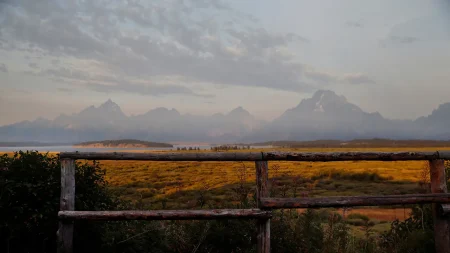Dozens of anti-Israel protesters broke into Hamilton Hall at Columbia University, taking it over early Tuesday morning after the school began suspending students who refused to vacate their encampment. Videos on social media show protesters blocking doors with wooden chairs and tables, while a photo shows a masked protester zip-tying doors shut. The group barricaded themselves inside the building, covered security cameras, and even held some workers hostage before eventually allowing them to leave, with one worker yelling that he was held against his will.
The protest, which began over a week ago, has been centered around the school’s anti-Israel encampment located along the South Lawn. The protesters at Hamilton Hall worked quickly to ensure they had control of the building, taking drastic measures to secure their position despite the presence of workers inside at the time. Chants of “hey hey, ho ho, the occupation has got to go” could be heard from protesters outside the building, capturing the tense and chaotic atmosphere that unfolded during the incident.
While the protesters were successful in taking over Hamilton Hall, their actions have raised concerns over safety and security on the Columbia University campus. By barricading themselves inside the building, covering security cameras, and holding workers hostage, the protesters demonstrated a willingness to take extreme measures to make their voices heard. The wild scene that played out during the takeover of Hamilton Hall highlights the tension and division surrounding the anti-Israel encampment at the university.
The incident at Columbia University represents a broader trend of activism on college campuses, where students are increasingly using direct actions to protest against a variety of social and political issues. The takeover of Hamilton Hall by anti-Israel protesters showcases the power dynamics at play between students and university administrations, as well as the challenges of balancing free speech with campus safety. As universities navigate these complex issues, the consequences of student activism can have far-reaching impacts on campus culture and the broader community.
In response to the takeover of Hamilton Hall, Columbia University may face criticism for how it handled the situation and for the suspension of students involved in the encampment. The university’s response to the protest, including the suspension of students and the handling of the incident at Hamilton Hall, will likely be scrutinized by students, faculty, and the wider public. The implications of these actions could have lasting effects on the university’s reputation and relationship with the student body, as well as its approach to managing future protests and activism on campus.
As the situation at Columbia University continues to unfold, it is evident that the incident at Hamilton Hall has injected new energy and urgency into the ongoing debate over the anti-Israel encampment and student activism on campus. The actions of the protesters, as well as the response of the university administration, highlight the complex dynamics at play in higher education and the broader political climate. As students, faculty, and administrators grapple with the aftermath of the takeover, the legacy of this event may shape the future of activism and protest at Columbia University and beyond.















